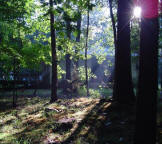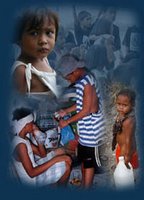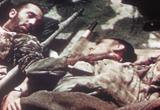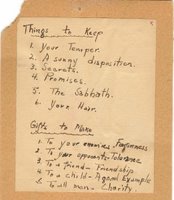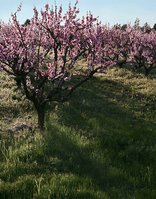 May after a long cold winter on the harsh Minnesota prairie:
May after a long cold winter on the harsh Minnesota prairie:Its arms to the dancing blue and its eyes to snow-capped heights,
And toes deep clinging to the prairie soil,
It grew—a radiant Peach Tree—in tender tones singing
The mystery of spring, the beauty of love,
‘Til everyone could know,
The joy of a peach tree aglow.
Through her poems mom expresses her relationship with herself and her world, a relationship of intuitive creativeness, where her poetry serves as both a vehicle for bonding and communicating and as a device to protect. She can hide her true feelings in poems, conceal her thoughts in images neatly arranged to stand on their own—stand even as they have in her case silent on scraps of paper for over 80 years!
The American poet, Marianne Moore, said, “Poetry provides a place for the genuine…creates imaginary gardens with toads in them.” In general, mom’s poems present two general outlooks: the devotional sentiments of her Catholic faith and the creative free-wheeling imagination of her poetic spirit. Although mom’s poems were written just after WWI, during the wild, rebellious jazz age of the Roaring 20s, through the Great Depression years, and during and after WWII—a period when many prominent British and American poets were expressing uncertainty over a cold tension-filled universe bereft of order, design and purpose—mom maintained an
 unwavering faith and optimism in God and the natural order of things. If she felt any doubts or ambivalence, it was only about the decisions of human leadership, particularly political and military leaders who were too willing to send our nation’s—or any nation’s—young off to war, as expressed in Mark Ye, Men of War and Political Fame and Between Two Fronts.
unwavering faith and optimism in God and the natural order of things. If she felt any doubts or ambivalence, it was only about the decisions of human leadership, particularly political and military leaders who were too willing to send our nation’s—or any nation’s—young off to war, as expressed in Mark Ye, Men of War and Political Fame and Between Two Fronts.For her there is always a logical structure and explanation to things. She expressed and reinforced this belief through the themes, structure, diction, settings and imagery of her poems. These are not the expressions of someone whose soul is wracked by doubt and anxiety and who is now drifting without purpose or destination, as many young restless writers her generation—called “the lost generation”—became when they gathered in Paris after World War I in a desperate search for a fun and a faith to believe in. F. Scott Fitzgerald, author of The Great Gatsby, was one of these restless souls. So was Ernest Hemingway, who wrote about them in his first novel, The Sun Also Rises. Rather, mom’s poems are the statements of someone very clear about who she is, where she is and where she is going. Raphael, Gifts of a Woman and Song of Life are just three of several poems that articulate her clear sense of identity, place and direction.
Mom’s poetic spirit was akin to that of Emily Dickinson's, a 19th century poet who lived in solitude and wrote lyrically of love, nature, death and eternity, and whose works weren’t
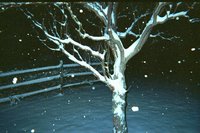 published until after her death and Robert Frost, America’s most popular poet of the 20th century. Frost found inspiration in the ordinary things around him—the landscape, a stone wall, paths in the woods, a snowy evening, a farmhouse—and regarded poetry as something that” begins in delight and ends in wisdom—is a momentary stay against confusion.” Though Frost’s style of poetry reflected the romantic style of the1800’s, whose themes depicted man and nature living in harmony with each, his actual themes depicted more of a split between man and nature. Nature’s meanings and secrets remained mysteries to man, so serenity was achieved, not in understanding nature’s secrets but in simply appreciating them and toiling productively and usefully amid the external forces of nature. To Frost, we are sustained and nourished by “significant toil.” Mom’s poem, Be Strong, captures this work ethic:
published until after her death and Robert Frost, America’s most popular poet of the 20th century. Frost found inspiration in the ordinary things around him—the landscape, a stone wall, paths in the woods, a snowy evening, a farmhouse—and regarded poetry as something that” begins in delight and ends in wisdom—is a momentary stay against confusion.” Though Frost’s style of poetry reflected the romantic style of the1800’s, whose themes depicted man and nature living in harmony with each, his actual themes depicted more of a split between man and nature. Nature’s meanings and secrets remained mysteries to man, so serenity was achieved, not in understanding nature’s secrets but in simply appreciating them and toiling productively and usefully amid the external forces of nature. To Frost, we are sustained and nourished by “significant toil.” Mom’s poem, Be Strong, captures this work ethic:We are not here to play, to dream, to drift.
We have hard work to do and loads to lift.
Like Frost, mom highlighted her relationship with ordinary things. Her poetry advocates an active life over the passive and suggests the tenacity necessary for victory over life’s struggles, a tenacity equal to the iron grip of a honeysuckle tendril. It conveys an attitude of someone in complete touch with her environment, complete absorption in the moment, and complete acceptance and enjoyment of the absolute. It presents an affirmation of life’s mystery and beauty, and not an attempt to understand it. Again in The Mystery of Spring, she captures this Frost-type element:
Still, no one knew from a mere glimpse of this tree
What sort of friend it might someday be.
Though mom knew struggle from her years growing up on the farm and raising a family through the depression, the dominant feeling of her poetry is optimism and appreciation for life and the life potential of nature. She saw images and heard sounds of beauty all around her, as expressed in these lines from Sunset:
Warm downy clouds aglow with light,
Above and beyond green lacy trees
Ever shading from greys to purplish –pink to white…
The chirp, chirp of a bird/
And a dark flash ‘gainst the sky
The crying laughter of children
In the yard nearby…
Mom’s response to nature was visceral and spiritual. Her poems about nature, like her devotional poems, were expressions of faith in the purpose and design of the universe, of a belief that God guides all living things—man and birds alike, flowers, trees and the ebb and flow of the sea. Her belief was not a blind, mindless one, but a philosophical questioning and wondering, a philosophy of being part of the earth, one based on the premise that nature is truth. If she had a wish to escape or retreat, it was to this aspect of nature, and not simply to be free of suffering and pain. For mom a visit to the sea is a return to our origins. We leave our troubles behind, are comforted and awed by sea life, regain on the dunes and the edge of the surf our true perspective. This was the attitude behind her spending days upon days with us at the beach: keeping herself and her sons and daughters connected to their place in the universe. She knew the practical value of a day at the beach, too. After romping all day in the sand and surf, we ate well when we got home and slept well at night!
For mom as for many poets, the physical world corresponds to the inner world. Her life is bound with the life of nature. As a child growing up on a farm, it is natural for her to feel the mighty power behind life’s shifting scenes and mysteries….the ebbing and flowing, waxing and waning, being born and dying. Her poetry is marked by the language of yearly decay and the yearly renewal of life. If she felt inner turmoil and restlessness at night, she expressed this mood through the image of shrouded red beacons of lights passing through the pulled curtains from the distant shore, as in her poem Perspective: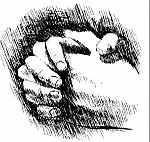

Through the darkened curtains of night,
Two red beacons of the air,
On the distant shore,
Keep their lonely vigil with my fingers,
While I “tune in” with God.
Mom believed in the larger and enduring unity behind the specifics of life and death. For her, death is the point at which we pass into the eternal spring, the eternal now, the world of infinite life and eternal affirmation and splendor. It is a return to the source of all beauty. Her poetry, however, is not just serious or prayerful or political. There is a light and playful side, too, perhaps the natural Irish wit and humor, the twinkle in the eye, that we all enjoyed along side her sense of devotion and discipline. This playful, free spirit is captured most beautifully in the poem, The Little Knife:
I’m a powerful thing,” said the Little Knife.
“How is that?” asked the Oak’s jealous wife.
“While others must sing and dance for their life,
I just cut and cut,” said the Little Knife.
“You silly thing!” sang the tree so tall.
“How could powerful be such a thing so small?
You’re not strong or big like me,
Nor up in the winds and always free.
You can’t wave your arms or bend your knees.
You can’t dance with the wind whenever you please!
What a powerful thing, indeed!” laughed the tall tree’s wife.
“You’ll know when I cut!” warned the Little knife.
This poem moves on, logically, lyrically, delightfully to a fitting end. It provides in combination with the poems below a rare glimpse into a perspective that bridges and transcends nearly forty years.
Since most of mom’s poems were undated and written on fragments of paper, it is impossible to place them into an exact time frame. Collectively, however, they provide an inspiring view of the spirit of a remarkable person who, in the midst of keeping step with the events of her time, moving from house to house and city to city, and raising nine children, found a way to create, over the years, maybe one day between kitchen chores or one evening after the children were asleep, “a momentary stay against confusion.” In putting down her thoughts neatly into words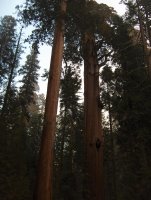 and rhymes and sentences and lines, mom ordered her world. She found in that order reflections of the love and beauty and peace and purpose that already existed deep within her, and all around her, from her days as a child on the prairie in Minnesota in the early 1900s to her very last days in California in 1997, where, alongside a rose garden, beneath a towering eucalyptus grove, amidst the vast and beautiful and fertile fields and orchards of California’s Central Valley, in the shadows of the spectacular High Sierras—where giant Sequoias really do “dance with the wind” whenever they please—mom passed into her Eternal Spring, returned to the Source of All Beauty.
and rhymes and sentences and lines, mom ordered her world. She found in that order reflections of the love and beauty and peace and purpose that already existed deep within her, and all around her, from her days as a child on the prairie in Minnesota in the early 1900s to her very last days in California in 1997, where, alongside a rose garden, beneath a towering eucalyptus grove, amidst the vast and beautiful and fertile fields and orchards of California’s Central Valley, in the shadows of the spectacular High Sierras—where giant Sequoias really do “dance with the wind” whenever they please—mom passed into her Eternal Spring, returned to the Source of All Beauty.
Warm downy clouds aglow with light,

Above and beyond green lacy trees
Ever shading from greys to purplish –pink to white…
The chirp, chirp of a bird/
And a dark flash ‘gainst the sky
The crying laughter of children
In the yard nearby…
Mom’s response to nature was visceral and spiritual. Her poems about nature, like her devotional poems, were expressions of faith in the purpose and design of the universe, of a belief that God guides all living things—man and birds alike, flowers, trees and the ebb and flow of the sea. Her belief was not a blind, mindless one, but a philosophical questioning and wondering, a philosophy of being part of the earth, one based on the premise that nature is truth. If she had a wish to escape or retreat, it was to this aspect of nature, and not simply to be free of suffering and pain. For mom a visit to the sea is a return to our origins. We leave our troubles behind, are comforted and awed by sea life, regain on the dunes and the edge of the surf our true perspective. This was the attitude behind her spending days upon days with us at the beach: keeping herself and her sons and daughters connected to their place in the universe. She knew the practical value of a day at the beach, too. After romping all day in the sand and surf, we ate well when we got home and slept well at night!
For mom as for many poets, the physical world corresponds to the inner world. Her life is bound with the life of nature. As a child growing up on a farm, it is natural for her to feel the mighty power behind life’s shifting scenes and mysteries….the ebbing and flowing, waxing and waning, being born and dying. Her poetry is marked by the language of yearly decay and the yearly renewal of life. If she felt inner turmoil and restlessness at night, she expressed this mood through the image of shrouded red beacons of lights passing through the pulled curtains from the distant shore, as in her poem Perspective:

Through the darkened curtains of night,
Two red beacons of the air,
On the distant shore,
Keep their lonely vigil with my fingers,
While I “tune in” with God.
Mom believed in the larger and enduring unity behind the specifics of life and death. For her, death is the point at which we pass into the eternal spring, the eternal now, the world of infinite life and eternal affirmation and splendor. It is a return to the source of all beauty. Her poetry, however, is not just serious or prayerful or political. There is a light and playful side, too, perhaps the natural Irish wit and humor, the twinkle in the eye, that we all enjoyed along side her sense of devotion and discipline. This playful, free spirit is captured most beautifully in the poem, The Little Knife:
I’m a powerful thing,” said the Little Knife.
“How is that?” asked the Oak’s jealous wife.
“While others must sing and dance for their life,
I just cut and cut,” said the Little Knife.
“You silly thing!” sang the tree so tall.
“How could powerful be such a thing so small?
You’re not strong or big like me,
Nor up in the winds and always free.
You can’t wave your arms or bend your knees.
You can’t dance with the wind whenever you please!
What a powerful thing, indeed!” laughed the tall tree’s wife.
“You’ll know when I cut!” warned the Little knife.
This poem moves on, logically, lyrically, delightfully to a fitting end. It provides in combination with the poems below a rare glimpse into a perspective that bridges and transcends nearly forty years.
Since most of mom’s poems were undated and written on fragments of paper, it is impossible to place them into an exact time frame. Collectively, however, they provide an inspiring view of the spirit of a remarkable person who, in the midst of keeping step with the events of her time, moving from house to house and city to city, and raising nine children, found a way to create, over the years, maybe one day between kitchen chores or one evening after the children were asleep, “a momentary stay against confusion.” In putting down her thoughts neatly into words
 and rhymes and sentences and lines, mom ordered her world. She found in that order reflections of the love and beauty and peace and purpose that already existed deep within her, and all around her, from her days as a child on the prairie in Minnesota in the early 1900s to her very last days in California in 1997, where, alongside a rose garden, beneath a towering eucalyptus grove, amidst the vast and beautiful and fertile fields and orchards of California’s Central Valley, in the shadows of the spectacular High Sierras—where giant Sequoias really do “dance with the wind” whenever they please—mom passed into her Eternal Spring, returned to the Source of All Beauty.
and rhymes and sentences and lines, mom ordered her world. She found in that order reflections of the love and beauty and peace and purpose that already existed deep within her, and all around her, from her days as a child on the prairie in Minnesota in the early 1900s to her very last days in California in 1997, where, alongside a rose garden, beneath a towering eucalyptus grove, amidst the vast and beautiful and fertile fields and orchards of California’s Central Valley, in the shadows of the spectacular High Sierras—where giant Sequoias really do “dance with the wind” whenever they please—mom passed into her Eternal Spring, returned to the Source of All Beauty. 



